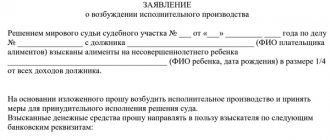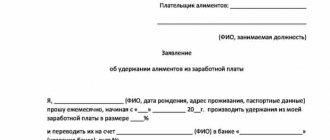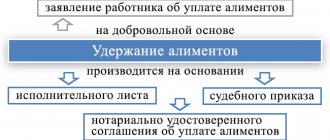The range of rights and responsibilities of bailiffs regarding the collection of alimony
A bailiff is an official who, in accordance with federal laws and departmental regulations, carries out activities aimed at implementing court decisions, decrees and rulings. Its competence also extends to the collection of alimony and other debts. To begin enforcement proceedings, the bailiff for alimony must receive a writ of execution, on the basis of which the enforcement case is opened. He reflects all subsequent significant actions in the file.
To better understand the specifics of this specialist’s work, let’s define the bailiff’s terms of reference.
So, the bailiff has the right:
- Call the debtor and the person in whose favor alimony or other payments are being collected.
- Receive documents, information and explanations from the specified persons in accordance with the procedure established by law.
- Make requests for necessary information:
A) to state authorities and local self-government;
B) to enterprises, institutions and organizations of all forms of ownership.
Necessary information should be considered that information that can help with organizing the collection of alimony payments. A certificate from the BTI will help identify real estate owned by the alimony debtor, from the traffic police - motor vehicles, at the place of work or service - in order to identify the amount of the payer's earnings and withhold its part, established by the court and specified in the executive documents - for making alimony payments; to the address bureau - in order to establish the location of the payer, etc.
- Carry out visits to the place of work, residence or location of the debtor, enter premises in order to identify property belonging to the payer.
- Conduct an inventory and seize property within the limits of debt and costs associated with enforcement proceedings, as well as take measures aimed at seizing funds held in accounts in banking institutions - in order to write off part of them to pay off the debt to the claimant.
- Interact with the Department of Internal Affairs - send requests to put the debtor on the wanted list, raise the issue of initiating a criminal case for malicious evasion of execution of a court decision under Art. 175, 315 of the Criminal Code of the Russian Federation.
- Carry out other activities established by current legislation.
As can be seen from the above, the bailiff has a fairly wide range of powers established by laws and other regulatory documents in order to ensure timely, systematic and complete collection of alimony payments from the payer.
Ending
Proceedings for the collection of alimony are considered completed in the following cases:
- Fulfillment of stated requirements.
- Declaring the debtor bankrupt.
- Transferring a copy of the writ of execution to the debtor’s place of work to collect monthly payments from him in the established amount.
The termination of the case is not an obstacle to carrying out enforcement actions on it in the future - both the claimant himself and the senior bailiff or his deputy have the right to resume the process on their own initiative.
Qualified legal assistance is needed at all stages of the process of collecting alimony, but especially during enforcement proceedings. Without it, the creditor and the debtor risk facing unlawful actions of officials, and each of them risks the dishonest behavior of the opposite party.
To avoid misunderstandings and obvious violations of your legal rights, it is important to contact lawyers in a timely manner, especially since, thanks to the specialists of our website, this is available free of charge and in a format convenient for you - online or by telephone.
FREE CONSULTATIONS are available for you! If you want to solve exactly your problem, then
:
- describe your situation to a lawyer in an online chat;
- write a question in the form below;
- call Moscow and Moscow region
- call St. Petersburg and region
Save or share the link on social networks
- FREE for a lawyer!
Write your question, our lawyer will prepare an answer for FREE and call you back in 5 minutes.
By submitting data you agree to the Consent to PD processing, PD Processing Policy and User Agreement
Useful information on the topic
Application to the prosecutor's office for non-payment of alimony
Alimony payments help a single mother or father stay afloat, support...
Indexation of alimony
Due to the fact that prices are constantly rising, in some...
1
Minimum amount of child support
There is not a single clause, regulation or clarification in the legislation that...
1
Can a father or mother file for child support for their son?
Parents who have cared for their children in their later years have the right...
6
Receipt for receipt and payment of child support
Alimony can be transferred to the recipient in any convenient way, the legislation in this...
1
Court order for the collection of alimony
The rules for collecting alimony have changed somewhat since 2020 and...
Deadlines for contacting bailiffs
The legislation of the Russian Federation does not establish strict deadlines for applying to the Federal Bailiff Service. Having a writ of execution and a court decision in hand, an application can be submitted to the bailiffs at any time before the child reaches the age of majority. In addition, the law gives the right to citizens who have reached the age of 18 to independently apply for the collection of alimony payments from a parent. In the latter case, the period for opening enforcement proceedings is limited to when the citizen reaches 21 years of age.
Important! It happens that a claimant, having enforcement documents in hand, does not immediately go to the FSSP to open an enforcement case. This is due to the peculiarities of the relationship with the payer. Often, the ex-spouse unofficially transfers money to support the child or children, purchases things, pays related expenses, and after a while evades these responsibilities for various reasons. Years may pass from the moment the executive documents are received. In this case, the bailiff, having received a package of documents to open proceedings, has the right to collect from the payer the amount only for the last three years, and not from the date the court established alimony.
Options
• It is mandatory to independently monitor the entire process of judicial execution. This means that you should call the debtor at work, at his home, or at the bailiff service.
• Submit an application to search for the debtor or his property, and you can also demand that the debtor be prohibited from leaving the country for a certain time.
• Write and send (by registered mail) to the service that is responsible for executing the court decision, a statement in which you request that all copies of documents related to the progress of your case be sent to your address. Provide information about the measures that were taken to obtain a positive result. If no response is received, you can appeal in court against the inaction of the bailiffs in collecting alimony.
• Contact a law office and hire an experienced specialist who will help move the case forward.
If you have suspicions that the bailiffs are not looking diligently enough for the debtor, all that remains is to file complaints against them to the relevant authorities or resort to alternative methods of solving the problem.
How to find the nearest FSSP department
Where to begin? How to contact the bailiff service?
Territorial divisions of the FSSP are located in all territorial units of the Russian Federation. The location of the nearest department can be found on the official website of the service - https://fssprus.ru/.
The site is quite user-friendly and allows you to find the FSSP body you are interested in using filters in the search form, as well as by identifying the location of the department at your specified home address. There you can also find out the phone numbers of the required department.
In addition, the desired department can be found using search engines and universal online directories (2GIS, for example).
List of documents required for submission to the FSSP when opening enforcement proceedings
Enforcement proceedings begin only at the request of the claimant, in whose favor a court decision has been made.
What documents are required for bailiffs for alimony?
On your first visit to the FSSP department, you must have the following documents:
- Passport
- Child's birth certificate.
- Document of title for receiving alimony: Writ of execution;
- The court's decision;
- Court order, if the case was considered by writ;
- A written agreement from the payer to pay alimony and obtain a court decision.
When will the application be denied?
The legislation provides for cases when, instead of a decision to initiate proceedings, the bailiff issues a refusal. This happens in the following cases:
- The application is missing or not signed by the recipient (except in cases where a personal signature is not required, for example, due to the incapacity of the claimant or in the case when representatives act on his behalf by power of attorney).
- The territorial jurisdiction of the consideration of cases has been violated.
- The deadline for filing claims for alimony has passed.
- The writ of execution is missing, it was drawn up with violations, or a case has already been initiated based on it.
The bailiff's refusal can be appealed to a higher official or in court within 10 days.
Drawing up and submitting an application to the FSPP for the collection of alimony
How to write a statement to bailiffs?
A sample application to bailiffs for a writ of execution, as well as the corresponding application form, can be downloaded on this website. The application must indicate the most complete data; if necessary, attach to the application documents confirming the financial and property status of the payer: certificates, extracts, originals and copies of title documents. It will be very useful to issue a cover letter to the bailiff regarding alimony.
The procedure and features of the activities of bailiffs
Many are interested in the practical implementation of the above. How does the enforcement process actually work?
Within three days after receiving the application with other documents, the head of the FSSP department selects an employee to whom he entrusts the materials. The department specialist makes a decision to open enforcement proceedings, after which he sends a notice to the payer or informs about this procedural action personally by calling the department or visiting the place of residence or work.
At the first personal meeting (if one took place), two scenarios are possible:
- The meeting is as productive as possible: mutual agreement is reached on a number of key issues: the amount of payments, their voluntary nature, frequency and sources. In addition, the payer undertakes to inform the bailiff about all payments made and transfers of funds in favor of the recipient.
- The alimony holder refuses to pay alimony in whole or in part, citing lack of work, difficult financial situation, unwillingness or disagreement with the size and frequency of payments. In this case, the bailiff carries out forced collection of payments and the debt incurred on them in accordance with his powers: requests are sent to the employment center, tax service, traffic police, BTI and financial institutions in order to establish the volume of movable and immovable property, as well as funds, belonging to the payer for further collection of the amount of debt and seizure of property.
To tell the truth, this work is extremely thankless and its high-quality execution is impossible in many cases for a number of reasons:
- Enormous workload: for each bailiff in the city there are several dozen or hundreds of enforcement cases. It is impossible to deal with everyone at the same time, as well as to monitor the payer’s fulfillment of his obligations.
- Low level of legal culture of the population. We are talking not only about alimony dodgers, but also about recipients who do not appear when called to the FSSP and do not submit the necessary documents in a timely manner.
- Imperfections of the legal system and the structure of the FSSP as a whole.
In practice, the recipient independently controls the payment of alimony, and in case of violations, he reacts by contacting the FSSP and the prosecutor’s office. If there is a risk that the payer will leave the country without paying alimony, the recipient should immediately contact a specialist handling the case.
You can contact the bailiff by filing an appropriate petition. The petition may set out the following requirements limiting the payer’s freedoms:
- limit the possibility of the debtor crossing the state border of the Russian Federation in order to prevent evasion from paying alimony prescribed by the court;
- seize property in order to ensure enforcement proceedings.
In the first case, the bailiff issues a reasoned decision banning leaving the territory of the Russian Federation for a period of 6 months and sends a copy of this document to the Directorate for Migration Issues under the Russian Ministry of Internal Affairs.
In the second case, the petition must indicate a list of property and its value, if possible. The seizure of property limits the debtor's right of ownership: until the debt is repaid, he does not have the right to alienate it if it was left to him for safekeeping, and in case of seizure, to own and use it. If the debtor has not taken measures to pay the amount of the debt, the property will be sold at a special auction, and the proceeds from the sale will go towards alimony and penalties incurred due to late payment.
Obtaining a certificate of alimony from the FSSP
One of the most “popular” documents in the interaction between the recipient, the payer and the FSSP is the alimony certificate, which is a reflection of the good faith of the alimony recipient, as well as the implementation of enforcement proceedings. In addition, it is required in various organizations and institutions to confirm income: the tax service, financial institutions, employment centers, social services. An honest alimony worker can always apply to his place of work for a certificate of deductions from wages towards alimony payments. The recipient, in turn, takes this certificate from the bailiff conducting the proceedings.
As such, there is no single form of alimony certificate established. However, there are the following mandatory information contained in this document:
- Complete information about the recipient and payer.
- Number and date of issue of the writ of execution, name of the court.
- Production start date.
- The amount of transfers from the payer in favor of the recipient, indicating the dates. Total amount of payments.
- Information about the withholding of alimony from the income or property of the debtor.
- Date of issue of the certificate, validity period (relevance), full name of the bailiff who issued the document or employee of the enterprise where the payer works. The signature must be affixed with the seal of the organization, and in the upper left corner there must be a corner stamp with information about the issuance and registration of the document (number in the registration journal and from what date).
A sample certificate of alimony withholding can be downloaded from the website.
What does the claimant have the right to expect?
The standard amount of alimony maintenance is not established by law. It is determined individually, based on the level of income of the payer and recipient, the existence of other material obligations of the alimony provider, the need to pay off additional sources of expenses, etc.
There are certain instructions regarding the amount of alimony in favor of a minor - according to Art. 81 of the RF IC, by default, a percentage of the parent’s total income is allocated for the maintenance of children: 25% for one child, 33% for two and 50% for three or more.
The following are taken into account:
- Wage.
- Prizes, allowances.
- Job salary.
- Pensions, benefits (including unemployment).
- Scholarships
- Income from business activities, rental and sale of personal property, etc.
If the reliable amount of the payer’s income cannot be established or it is unstable, the child’s representative has the right to file a claim for the recovery of alimony in a fixed amount.
Monthly maintenance for other family members is determined exclusively in the form of a fixed payment (not in a shared ratio).
Replacement and removal of a bailiff
Many of us do not like the quality of work of civil servants for these reasons; some recipients are also not satisfied with the personal characteristics of officials who provide services or perform their duties in your interests. People also work at the FSSP - and these people are different. Despite the fact that their activities are regulated by regulations and rules of professional ethics, there are different employees - rude and soft, boorish and polite, responsible and careless. Therefore, recipients of alimony and other payments often have a desire to apply to change the bailiff. Legally, this possibility is not provided. However, at the same personal level, replacement is possible. By writing complaints to the prosecutor's office and a higher-ranking bailiff, you express your distrust of him, and the management of the department, in order to prevent such conflict situations, has the right to appoint another executor.
If you objectively believe that the bailiff is biased towards you due to previous acquaintance with him or the presence of family ties with him, then there is every reason to write a petition to challenge the bailiff. True, if the fact of a family connection is known in advance, then the bailiff himself must recuse himself. The same applies to cases where the bailiff is personally interested in the outcome of the proceedings.
Loss of case materials: procedure and consequences
This is a fairly rare case, but it is worth knowing the algorithm of actions if the case was lost unintentionally or “on purpose.” Why "specially"? Because in the FSSP departments there are journals for recording the movement of cases and it will not just disappear anywhere. But we should not discount the possibility of an employee’s negligence, for which he will certainly bear responsibility. If a loss is discovered due to the fault of a bailiff or department, the following must be done:
- File a complaint to the district prosecutor's office, describing in detail the circumstances and progress of the enforcement proceedings. The prosecutor's office orders an investigation and the case is often found.
- Write a petition to the court that made the decision to establish alimony to issue a duplicate of the decision and writ of execution.
- Submit an application to reopen enforcement proceedings. However, if the documents were truly lost, then completely recovering all the collected data is extremely problematic.
When necessary
The need to initiate enforcement proceedings arises if there is no agreement between the recipient and the payer on the procedure and amount of monthly transfers.
Most often, this happens when the alimony holder refuses to voluntarily pay part of his income for the maintenance of a relative or family member who, by law, needs to receive financial assistance from him.
In accordance with the Family Code of the Russian Federation, the category of alimony recipients includes:
- Minor children.
- Adult disabled children.
- Disabled needy parent.
- Spouse (including ex-wife) during pregnancy and during the first three years of the child’s life.
- A spouse caring for a common disabled child (until he reaches 18 years of age) or a disabled child from childhood of group I.
- The husband/wife or former spouses, if they lost their ability to work during marriage or within a year after the divorce, or retired no later than five years after the divorce.
- Minor brothers, sisters and grandchildren, if they cannot get the necessary help from their parents.
- Adult disabled brothers, sisters, grandchildren in case of need and lack of material support from parents, children, spouse.
A person in need of assistance or his legal representative (one of the parents, guardian, trustee) for the forced collection of alimony first applies to the court, and then to the bailiff, who, by virtue of the powers vested in him, organizes the withholding of funds from the debtor’s income in during enforcement proceedings.









